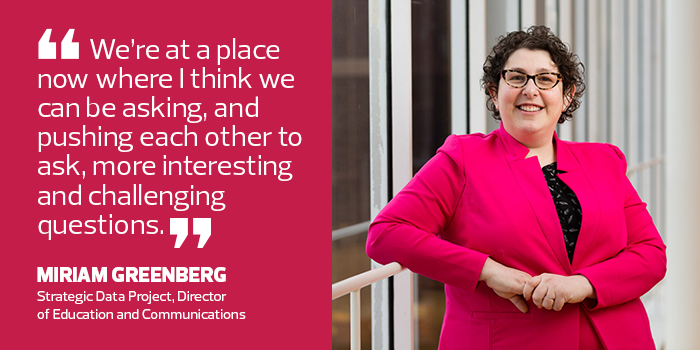Q&A: Harvard Strategic Data Project’s Miriam Greenberg on Better Data, Better Decisions
If leveraged effectively, data can mean the difference between a student failing out or graduating. While some institutions have already developed successful data initiatives, many can benefit from guidance as they explore this emerging field. Enter Harvard University’s Strategic Data Project, a network of education leaders and data strategists who seek to advance data-driven decision-making. EdTech magazine’s Meghan Bogardus Cortez spoke with SDP’s director of education and communications.
SIGN UP: Get more news from the EdTech newsletter in your inbox every two weeks!
EDTECH: What is SDP’s mission?
We started this organization to help the K–12 education sector use its unprecedented amount of data to answer important questions and uncover trends that could help unlock student achievement. Originally we focused on college enrollment and human capital, but now we are increasingly moving into new spaces, such as higher education. We are interested in not only the high school to college transition, but also postsecondary success.
EDTECH: Using data strategically is important. What’s the biggest challenge in going from collecting data to putting it to work to help students?
Data collection is one part, but then uniting and connecting all the silos within an organization, so the data can actually speak to each other, is another part. How do you marry all of these different pieces of data so that you can answer questions of critical importance?
The next part is making sure you are asking the right questions. We’re at a place now where I think we can be asking and pushing each other to ask more interesting and challenging questions. The final part is, how do you communicate the findings to a nontechnical audience, so they find data useful and not scary?
EDTECH: What best practices do you see at institutions that are doing it right?
One thing that is exciting is using stakeholders in the design of data systems. It’s important to understand, from a user perspective, what data is useful and what data is not. You have to get people information they need the most, so they can make decisions about instructional practices or policies. Great data strategists are speaking with policymakers and practitioners as they are designing the systems in the first place. I also see people trying to make data more transparent to aggregate findings to help individuals get better at their jobs. That’s an incredibly auspicious message for us all.

EDTECH: What’s the next evolution in data?
I think we’ll have new kinds of data to work with, and that’s exciting. That comes from, in part, the explosion of ed tech. One challenge I see now is that ed tech companies have a ton of data about students’ time on platform, interacting with various parts of the system or the platform software, but not a lot of that data actually ends up in the hands of folks at educational institutions. Even if you did evaluate the efficacy of a software program, you might not know what the use cases were, and that’s a problem. The extent to which we can start to, in the future, integrate metadata into our practice, to understand not just outcomes but also implementation — that’s what’s going to drive us forward.
EDTECH: Do you think emerging technologies like artificial intelligence might play a part in how data evolves?
I definitely think so. That might sound a little scary to some people, but it works. Georgia State University, for example, used artificial intelligence to help students navigate the road to college. That AI system was transformative for closing the achievement gap in a way I haven’t seen before. I hope that when we do use AI, it’s for really groundbreaking opportunities to address equity.
EDTECH: What can IT leaders do to help their staffs be an effective resource on data initiatives and a partner for the rest of the campus?
Step one is to build relationships across the system and the silos. The first thing the IT team needs to do is sit down with all of the stakeholders. I have seen very often that IT teams are divorced from the research and evaluation teams, and there’s almost a little bit of a battle around who gets the data, who owns it and who governs it. It needs to be a joint, collaborative effort. There are a lot of examples of where that happens really well. Those should be held up as a model for what progressive schools can do.
Step two is to make sure there is ongoing training. We all work for learning organizations; we’re supposed to be in the business of teaching and learning. Yet, we also need to be growing and learning. The Strategic Data Project is all about making sure that our data strategists and IT professionals get regular training in the new technologies and the strategic thinking needed to push the system to become better.
EDTECH: When you imagine future possibilities for data in education, what are you excited about?
There are definitely some evolving technologies out there that we don’t know how to harness that can uncover new insights. I do think that technologies aimed at making those analyses easier are good things that we should look forward to. New technology is exciting, but without great data strategists in place, that analysis is not going to happen. You need to let the back end and the front end do that work together.
At the same time, I want us almost to slow down in thinking so far ahead. We haven’t done all that we can do with what we have already. We haven’t tackled discipline disparities. We’re still not using data optimally. I think there’s a tendency for us to think about all the things that lie ahead. Until we start using the data we have to do interesting things, I would caution us to slow down and make sure we are thinking about the right questions first.









